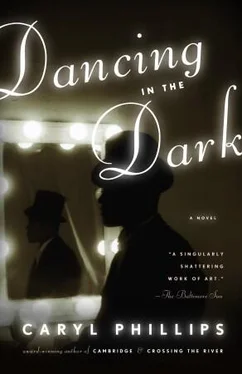The dressing room is the one place where he is able to think clearly, for the silence and privacy suggest to him the sanctity of a church. The dressing room is a place where he can sit alone and remember all that has gone before, and imagine all that is still to unfold. The mirror is the most important part of the room. The mirror and the lightbulbs. Plenty of bright, gleaming lightbulbs arranged tastefully around the perimeter of the mirror glass. And a door with a good lock to it. Two chairs, please. One in front of the mirror, and a softer chair where a man might relax and read a newspaper or a book and enjoy some peaceful contemplation. These few items are all a man needs in his dressing room. At the New York Theatre, at Forty-fifth Street and Broadway, where they played In Dahomey , he enjoyed a perfectly adequate dressing room. Whenever he needed privacy he simply locked the door and withdrew from everybody. A major New York critic had penned a favorable notice of the show, but the man described the star as an amiable coon who possessed “magnificent white grinders in a cavernous mouth.” Every evening, having washed his face and applied the towel, a despondent Bert stared into the mirror but he failed to see the amiable coon with the cavernous mouth who the influential critic had described.
George enjoys decorating his dressing room with large and some-what vulgar bouquets of sweet-smelling flowers, but Bert does not care for this kind of ostentation and so he seldom visits with George. In fact, Bert does not care for lace cloths, or perfumed water, or soft plump cushions, and there are always far too many people in George’s dressing room, but George understands his partner’s difficulties with strangers. When George wishes to talk with Bert he frequently travels to his colleague’s dressing room with a liquor bottle in one hand, and he is always careful to lock the door behind him before he sits down. He understands that if they are to talk, it is he who must visit Bert’s quarters, and so slender George, with his perfectly oval face and clothes that would grace a prince, grins at Bert and places his insubstantial weight on a creaky wooden chair and then lights his cigar and pours them both a drink as he makes ready to engage his partner.
. . .
“Bert, you really want to take the show to London?” George pulls eagerly on his cigar. “I thought you didn’t care for sailing on water. Man, I thought you just wanted to stay here and work on another show.”
Bert picks up George’s bottle and pours them both a second shot of whiskey. They clink glasses.
“If the Englishman wants to see In Dahomey , then maybe we should show the Englishman what we got.”
“So what you think we got, then?”
Bert laughs now — slow, rumbling laughter that rocks the room. George’s eyes light up.
“Come on, man, what you think we got that the Englishman needs to see? Besides high-toned women, fine music, fresh comedy, and all the dance stepping in the world?”
“Well,” says Bert, as he swirls the whiskey in his glass, “I figure that’s plenty to be going on with, don’t you? I’m ready to ease on over there and show the Englishman what we got.”
“You ready to cross water to do so?”
“Ain’t no other way of getting there.”
“Maybe the English will treat us with a little more respect.”
Bert continues to laugh. “George, you think they could treat us with less?”
Bert remembers his short week in New York vaudeville just before the opening of In Dahomey . He remembers sharing the bill with Maurice Barrymore, who, having finished his own act, liked to stand in the wings at every performance and peruse Bert’s technique, but this scrutinizing never troubled Bert. Everybody took from everybody else, and he saw no reason why this man should be any different. However, Barrymore’s studiousness annoyed the stagehands for Barrymore was not supposed to admire a man like Bert. Over the years, Bert has endured many problems with ill-bred stagehands, but nothing to match the difficulties that he encountered during this short week. A particularly rough-hewn man asked Barrymore if he really liked the nigger coon, but Barrymore simply glared. As Bert came offstage, and passed by them both, he heard the boorish stagehand say, “Yeah, he’s a good nigger, he knows his place.” Without breaking his stride, or looking at either man, Bert replied, “Yes, a good nigger knows his place. Going there now. Dressing room one.” Barrymore punched the stagehand in his mouth. Later, when George heard about the incident, he was livid, but Bert would not talk with George, or with anyone, about the unsettling episode.
Well, Bert, if the choices we got is working on another show, going back to vaudeville, or going to England, then let’s go to England. Another show can wait a while, but I don’t got your stomach, Bert, so I sure as hell won’t be doing no more vaudeville, no sir, not me. I reckon that George Walker is better than working with iron jaw acts, and regurgitators and acrobats straight from the ships, and long-limbed girls from burlesque who don’t understand that there’s no place in vaudeville for bare legs and foul language. America got those Wright boys up in the air, and automobiles rolling down the streets, and some kind of baseball World Series, and this is a new country for everybody, including the colored man. Damn it, we’ve gone beyond getting up there three or four times a day, even if they do give us prime billing. Everything in goddamn vaudeville is always rush, rush, rush, with the Jews playing the Germans, and the Germans playing the Irish, and the Irish playing the Chinese, and everybody thinking they can play colored because what’s a poor colored man going to do to stop them? We coloreds got to be doing more respectable work like In Dahomey instead of playing damn-fool happy creatures who between steamboat arrivals just pick cotton or fry fish until it’s time to slouch off again and tote some cargo and sing some coon songs. Williams and Walker done gone beyond vaudeville. We got to take our time and do what we do with style. In Dahomey is the thing, Bert, and no reason for us to be rushing to produce another show, or for you to be going back to no foolish vaudeville. We should do like you say and take our colored tails across that water to old London and show them what we got.
Bert always takes dressing room number one, while George establishes himself in dressing room number two. This is the way that it is, and neither man has ever discussed the subject, and if George has any cause for complaint, then Bert has not heard anything about it. George refills their glasses with whiskey and Bert proposes that they drink a toast. To England, and to their forthcoming salty voyage, during which, each evening, they will temporarily lose the sun on the other side of the sea.
On the long passage across the Atlantic Ocean, Bert’s cabin is his dressing room. It is his place of refuge, but in his cabin there are no oversized shoes, no ill-fitting pants, no overventilated coat. There is no smell of burnt cork, no communion with anxiety, no sense of performance hanging in the air. He has to neither apply nor does he have to scrape off the black from his face. He does not have to peer cautiously into the mirror wondering if any signs of disfigurement remain. His lips, are they normal? In this dressing room he need not look at himself with the sadness that precedes and concludes a performance. Here on the SS Aurania , his superior cabin is a dressing room where disguise is unnecessary. In the corner a silent clock stands tall, its wooden casing polished by the touch of many hands. He is leaving America behind.
His company trusts him. This evening he sits at a table with his wife and looks across at the fifty colored men and women huddled together in one corner of the ship’s dining room. They are sailing with him to England, following him over the horizon to a Europe that most of them have never seen. They are excited, and George is both entertaining them and lecturing them. Occasionally George looks up and glances in Bert’s direction and their eyes meet. There is a little nod of the head from both of them. The white diners look on in bemusement, but they stare hard at Bert, disturbed by the fact that his dignified presence among them is beginning to challenge their sense of who he is. Coon. The novelty is becoming tedious. Without his disguise their ability to trust him is being seriously undermined, and if truth be told, they would rather he knew his place and joined the Negro rabble.
Читать дальше












